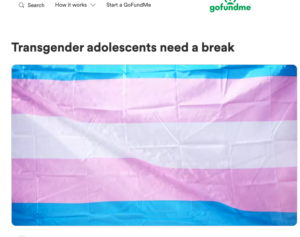 What is the crisis?
What is the crisis?
Last week, a group of desperate parents in Far North Queensland started a Go Fund Me campaign to raise money to fund Lucrin (a puberty blocker that blocks puberty without affecting height), at a cost of $4000 per year per child, for their vulnerable transgender and non-binary children.
The fact that they feel forced to take this measure speaks volumes about the crisis that is happening in our care of transgender and non-binary children in Queensland, due to a lack of resources and the centralisation of care to the Queensland Children’s Gender Service (QCGS) in Brisbane.
There is no doubt that the development of the QCGS has saved countless lives since its inception. It is not under any debate that the team there are beyond reproach in their compassion, care, professionalism and protection of our LGBTQIA+ children and youth. However, no one could have predicted the exponential growth in numbers of children across the state identifying as gender diverse and struggling with gender dysphoria since then. In fact, the numbers have more than tripled within the last two years and are continuing to rise at a surprising rate.
What impact is this having on regional youth and families?
The impact of this unexpected rise is that our young people are currently waiting between 9 and 12 months to be seen in Brisbane, for the urgent care category. The reality of this long wait is that many children are ‘aged out’ before they can be seen by the QCGS and the devastating and irreversible effects of puberty of their birth assigned gender have already begun. For those with gender dysphoria, the onset of puberty is a traumatic and life-threatening event – the time our transgender children are most vulnerable to self-harm and risk of suicide.
Since the Brisbane Gender Clinic opened, it has relied on a multidisciplinary model of care. This is best practice for the care of our vulnerable transgender youth and their success with vulnerable children is testament to the dedication and hard work of the staff. However, the clinic is overwhelmed by demand. While funding has not kept up with the need for gender services in Brisbane, the situation for regional areas is even more dire.
Prior to the formation of the Brisbane Gender Clinic, gender diverse children and youth were managed through regional children’s and mental health services. Subsidised puberty blockers were able to be prescribed locally.
However, an unintended consequence of the BGCS model of care, coupled with the huge growth in need, is that the Brisbane Gender Clinic are the only facility that are able to now prescribe subsided puberty blockers under the Queensland Health List of Approved Medications (LAM). In regional areas, parents at the coal face, desperate to keep their children from self-harm and suicide, are forced to privately fund the supply of this life-saving drug at a cost of $4000 per year to stave off puberty until their child can access proper treatment.
What is the solution?
There is a clear path that needs to be addressed urgently to rectify this issue. Firstly, we call on the Queensland Government to urgently address the funding shortfall and increase the capacity of the QGCS to protect the lives of transgender and gender diverse children and youth. Secondly, there needs to be an immediate interim policy adjustment to allow regional hubs to provide access subsided puberty blockers. There are areas of specialty expertise in regional areas such as Cairns, that can safely prescribe this treatment to children to prevent them from self-harm or suicide. Equitable access to treatment and medication must be a priority in our regional areas.
We call upon the Queensland Government and the Health Minister to please address this issue as a matter of urgency, as if lives depend on it. Because, quite simply, they do. Our children deserve to be prioritised and safe, and our regional families are especially vulnerable.
We hope this will be addressed as soon as possible. In the meantime, if you want to help these families in crisis, click on the picture above.
For more information email us at info@pflagbrisbane.org.au
